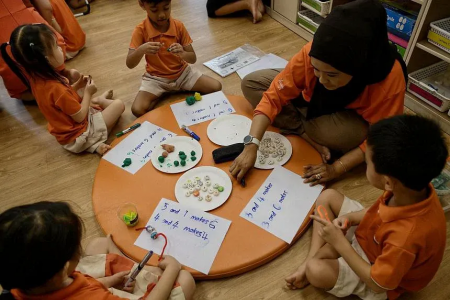Pre-schoolers from struggling families get leg up with therapy, financial and social support
Kevier Loe often missed kindergarten in early 2022 because his hawker parents were afraid he would get Covid-19 whenever there were cases in school.
They were worried their livelihood would be affected if their six-year-old spread the infection to them.
But they were persuaded by My First Skool to send him back to school regularly, as part of a broader intervention that helps 5,000 pre-school pupils a year from lower-income families.
The support programme includes speech and other therapy support, small group lessons, social-emotional lessons, as well as financial and social assistance.
Pre-school operator NTUC First Campus said on Thursday that such a programme helps to narrow the gap between less advantaged children and their peers, based on a study it conducted in collaboration with National Institute of Education (NIE).
The three-year study, which started in 2019, tracked the well-being and learning progress of 58 children from 10 My First Skool centres, from the time they were in Kindergarten 1 to when they began Primary 1 in 2021.
The children who went through the programme showed improvement in their language and cognitive skills, moving from a below-average score of 88.63 to a score of 90 to 100 for their academic abilities, which is on a par with the national average for children of their age.
Some 30,000 children from the 146 My First Skool centres have participated in the programme since it started in 2016. They come from families with a household income of $4,500 or less per month, or may have mild developmental or learning needs.
NTUC First Campus, whose pre-school brands include My First Skool, taps a fund to subsidise school fees and assist struggling parents who are low-wage workers when, for instance, their children are ill and they are temporarily unable to work and earn an income.
The parents can also attend workshops on children's nutrition and caregivers' mental well-being as part of the programme.
Children with learning needs under the programme are taught in small groups with one teacher to five pupils, compared to the normal class size of 20.
NTUC First Campus has 90 classroom co-facilitators, in-house therapists, learning support educators and early interventionists, as well as staff with social work backgrounds to provide financial support, well-being programmes and parenting workshops.
They work with the parents, family service centres and the Child Protective Service to support the children.
Kevier's mother, Ms Ooi Poh Kim, said he had trouble with English pronunciation, and it did not help that the parents speak only Mandarin at home. He received focused language assistance and occupational therapy to help with this.
Social emotional lessons also helped him control his temper, said Ms Ooi.
"He became more mature," said the 43-year-old who has another son in Primary 3. "He fights less with his brother and will now practise English at home with him."
Ms Louisa Chng, chief child support officer at NTUC First Campus, said it aims to support 7,000 children a year by 2025.
Get The New Paper on your phone with the free TNP app. Download from the Apple App Store or Google Play Store now


